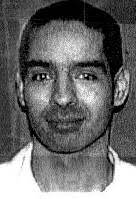Juan Rodriguez Chavez was executed by the State of Texas for the murder of Jose Morales
According to court documents Juan Rodriguez Chavez would walk up to Jose Morales who was using a phone, an argument would take place and Chavez would fatally shoot Jose Morales in the chest
During the time around the murder Juan Rodriguez Chavez would commit a series of armed robberies and nine additional murders: On March 22, 1995, in which Chavez shot and killed Jose Castillo and stole Castillo’s car keys; an incident on May 20, 1995, in which Chavez shot and killed Juan Pablo Hernandez and stole Hernandez’s car; and an incident on July 4, 1995, in which Chavez shot and killed three men – Antonio Banda, Michael Duran and Antonio Rios – after two of the men obstructed the entrance to a tire shop from which Chavez, Fernandez, and a third cohort planned to steal a car.
Juan Rodriguez Chavez Photos

Juan Rodriguez Chavez FAQ
When Was Juan Rodriguez Chavez Executed
Juan Rodriguez Chavez was executed on April 22 2003
Juan Rodriguez Chavez Case
A convicted killer believed responsible for at least a dozen slayings over a five-month period while on parole was executed Tuesday for one of five murders authorities said he committed on a single bloody night in Dallas eight years ago. Juan Rodriguez Chavez, 34, who had earned the nickname “The Thrill Killer” for the random attacks was smiling and grinning broadly as his mother, a brother and a sister came into the death chamber to watch him die.
“To the media, I would like for you to tell all the victims and their loved ones that I am truly, truly sorry for taking their loved ones’ lives,” Juan Rodriguez Chavez said in a brief and apologetic final statement. “I am a different person now but that does not change the fact of the bad things I have committed.” Chavez said he hoped God would give them the same peace that he had.
Looking at his relatives, he urged them to be strong and told them, “God is the way, the truth and the life.” He told the warden he was ready and closed his eyes, but looked up a few seconds later and asked, “Is it working?” He closed his eyes and began praying. As the drugs began taking effect, his eyes popped open, he gasped for breath and stopped breathing. Seven minutes later, he was pronounced dead at 6:18 p.m.
Jason January, one of the Dallas County district attorneys who prosecuted Chavez, said Chavez’s nickname fit. “He was truly a living breathing killing machine…,” January said. “He was one of the few people I dealt with in 15 years with the DA’s office that clearly demonstrated he enjoyed killing.”
Chavez was the 13th condemned prisoner put to death in Texas this year and the first of two on consecutive nights. Many of Chavez’s victims were robbed or carjacked. Some were shot with a handgun, others with a shotgun. Some were mowed down by a stolen car or truck — their heads deliberately run over after they already had been shot. “To shoot somebody, get a car and turn around and on several occasions take the tire of the vehicle and run over their heads, that’s sadistic,” January said.
Chavez, labeled an “equal opportunity assassin” by authorities, was condemned for the robbery and fatal shooting of Jose Morales, 39, gunned down July 3, 1995 while talking on a pay phone in northwest Dallas. A witness said he grabbed Morales’ wallet from his pants and shot him again before fleeing. The wallet contained $2. Morales was one of eight people shot — five fatally — during the early morning hours that day. Chavez was arrested a month later when he reported to his parole officer. He had been released from prison the previous year after serving less than half of a 15-year term for killing a neighbor during a burglary. Chavez, a ninth-grade dropout, was 17 at the time of that slaying.
At his trial for the Morales murder, he wore to court an electronic stun belt that inadvertently activated during the first day of testimony. Jolted by the voltage, he stood up, saying: “It’s shocking me,” then slumped to the defense table. He was uninjured but his attorneys asked for a mistrial, contending his constitutional presumption of innocence was violated. The request was denied, then became an issue in unsuccessful appeals.
Chavez was a middle child in a family of 19 born to a migrant farm worker couple who moved to Dallas three months after he was born in Fort Wayne, Ind., April 27, 1968.
While serving his first murder sentence, he accumulated more than 40 disciplinary violations, including punching a corrections officer and scaling a pair of fences topped with razor wire so he could attack another inmate in a recreation area. But by March 1994, he had accrued enough “good time” in prison to be paroled. “He should have never been let out of jail,” January said. “He’s a poster child for parole reform.” The killing spree began a year later with a fatal shooting during a robbery at a car wash.
At his trial, he was described as jovial, grinning at spectators, many of them relatives of slaying victims. When State District Judge Harold Entz asked if there was any reason he shouldn’t be sentenced, he replied: “I still say I’m not guilty.” He also had warned court bailiffs he would antagonize relatives of his victims, many of them Hispanic, by smirking. “I’m not going to let them see me sweat,” he said.
http://www.chron.com/cs/CDA/ssistory.mpl/metropolitan/1878828









